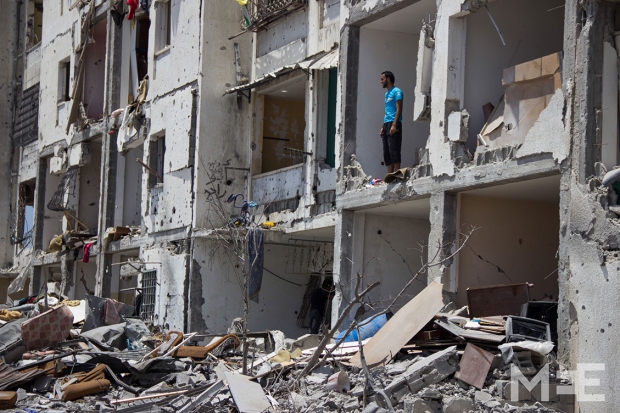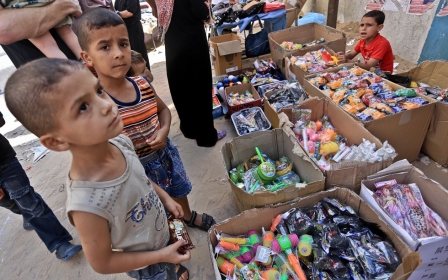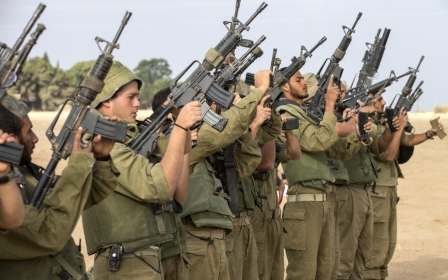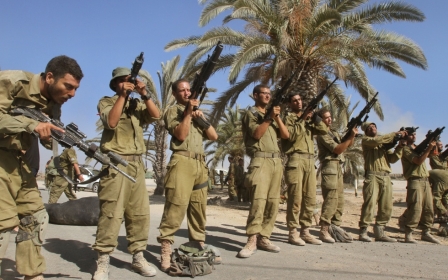Palestinians left facing the odds alone after ceasefire
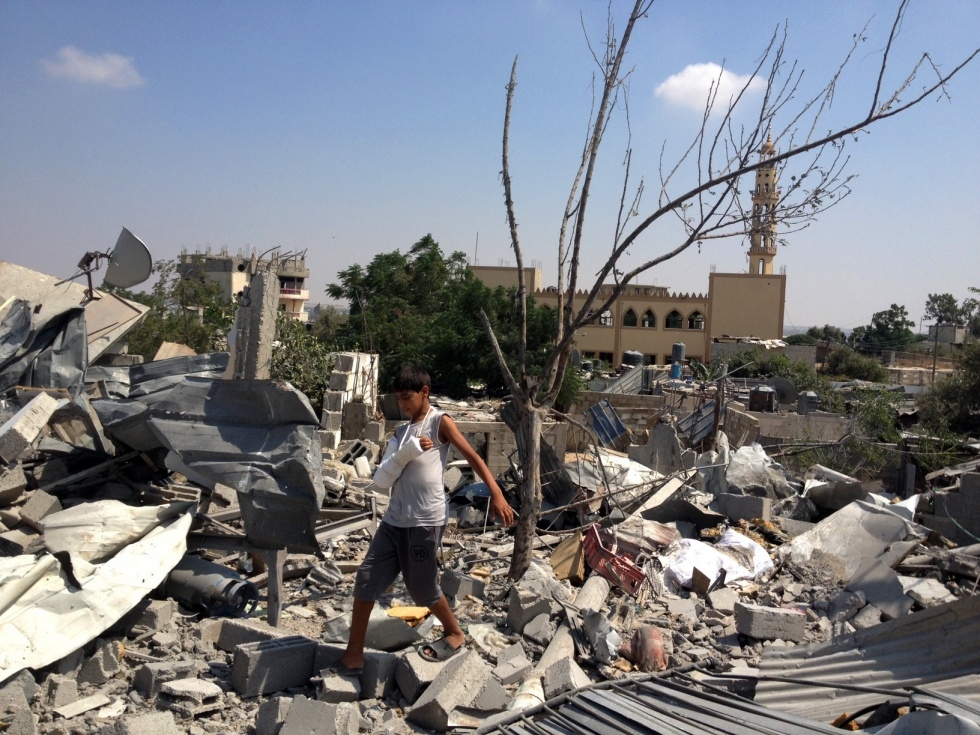
BEIT LAHIA, Gaza Strip - When Israel and Palestinian factions announced a 72-hour ceasefire, Umm Feras Abuelneen, 35, had few choices left open to her except to return to her apartment at al-Nada residential towers in Beit Lahia.
She expected little, but what met her eyes when she reached her home in the northern Gaza Strip was worse. The whole apartment was bombed and smashed. Dust and debris lay scattered everywhere, as if a hurricane had smashed straight into the center of it.
“They [Israel] bombed the hell out of our homes, with their Hellfire missiles, drones, tank-shells and gas which irritates the skin and eyes of my children,” says Abuelneen.
When Israel launched its offensive four weeks ago, Abuelneen managed to stay home for three days, but as Israel began to shower the north with leaflets warning of its planned escalation, she knew she had to go. As the first line of residential homes facing the northern border with Israel, her home was one of the first to be targeted by Israeli tanks that lines up close to, and set their sights on, the apartments.
“We tried to run away. I called ambulance and International Red Cross, but they told me there was nothing they could do and I would have to manage as best I could, on my own,” says Abuelneen, as she inspects the massive holes in what remains of her house as well as the craters around her neighbors’ now levelled homes.
While the horror has impacted everyone in Gaza, Abuelneen has been left particularly vulnerable. She is originally from Iraq, and has no real family in Gaza.
Her in-laws are based in Egyptian while her husband, Mohammed Abuelneen, was killed in 2002 by Israeli gun fire, shortly after he went to work as a bodyguard for former Palestinian President Yasser Arafat, in Ramallah.
“There are so many people, families, fleeing - many barefoot - trying to reach some place safe which hasn’t been hit. But everywhere has been hit,” says Abuelneen.
Frightened, tired, hungry and her feet sore, Abuelneen at last decided to leave her home and dragged her five children to a UN school, already filled with local refugees seeking shelter.
“The school we ran to, Abu Hussein school, was filled with civilians and later on Israel bombed that school too,” she says.
With her home, and now the UN shelter destroyed, Abuelneen’s only option was to run anywhere, to anyone who could offer even the semblance of protection.
As the sun set, Abuelneen and her five children were lucky and managed to find a sympathetic family that offered them refuge, but this shelter did not endure for long either.
“When we ran into their home, the cemetery facing them was under constant bombardment,” says Abuelneen. Eventually even the host family’s home was damaged after an Israeli drone struck the house next door.
An uphill struggle
Tears now flow freely down Abuelneen’s face as she holds her son Feras. The 13-year-old sustained injuries to his back and arms last Sunday and his ears still buzz from the noise of the missiles that hit him. He is just one of thousands of other children who have been injured during the grueling Israeli onslaught.
“Thank God he is still alive. I only have my children in this life,” says Abuelneen.
But the current truce brings only mild relief. Abuelneen is paperless and is unable to travel to her in-laws in Egypt, or to her parents in Iraq. She can only stay in Gaza with the five children but insists she remains firmly committed to raising and educating them, despite the extremely difficult security and economic situation.
How a widow will do this now that her apartment is severely damaged and has been burnt by tank shells, randomly fired by Israel on her neighborhood, is not immediately clear.
The whole area has been turned into a disaster area. Under the family’s tower lie hundreds of others who have also lost their homes. In the damage, one can see the remains of a supermarket. Diapers, toothpastes, spices and the remains of various other products are all seen strewn across the ground.
Men, women, and children have all come back to collect whatever they can retrieve from their homes; documents, bedding, clothing, food, pots, pans, cutlery and anything else they can carry away. But those desperately fumbling around for their possessions are the fortunate ones. Other families have come back to the dreadful task of digging out their loved-ones who were asleep when Israeli missiles hit.
In the 2012 war, Abuelneen’s home was also damaged but nothing remotely as serious as this Israeli attack. Back then, mostly window frames cracked and glass panes were shattered.
“I never received any compensation then because the apartment we live in is not in my name,” says Abuelneen. “It’s annually leased from the government. The same situation applies now, and most people living in government-leased homes may not get any reparations.”
Abuelneen knows that no officials will come and help her with the damage, but her resilience is reflected in her eyes that show a determination to carry on and try to salvage and rebuild a home from the holes, the ash, the dust, the rubble and the chaos that is all around left behind by Israel’s artillery shelling, again.
As sundown approaches, Abuelneen stands in the rubble sorting through dusty items, looking for a small corner where her and her children might be able to sleep and take shelter, at least, for the duration of the 72-hour ceasefire. Her children meanwhile gather together, trying to collect some photographs from the cupboard that is riddled with holes.
The Iraqi widow says she misses her husband, but as holds her children close and runs her fingers through her son’s hair. She explains that Feras, at 13-years-old, is the man of the house now that he husband is gone.
“I shall remain here with my children. We are not going anywhere.”
New MEE newsletter: Jerusalem Dispatch
Sign up to get the latest insights and analysis on Israel-Palestine, alongside Turkey Unpacked and other MEE newsletters
Middle East Eye delivers independent and unrivalled coverage and analysis of the Middle East, North Africa and beyond. To learn more about republishing this content and the associated fees, please fill out this form. More about MEE can be found here.


